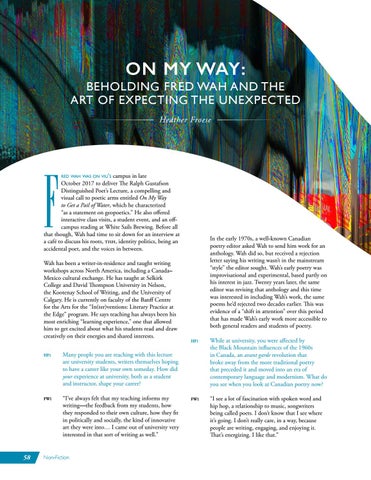ON MY WAY:
BEHOLDING FRED WAH AND THE ART OF EXPECTING THE UNEXPECTED Heather Froese
red wah was on viu’s
campus in late October 2017 to deliver The Ralph Gustafson Distinguished Poet’s Lecture, a compelling and visual call to poetic arms entitled On My Way to Get a Pail of Water, which he characterized “as a statement on geopoetics.” He also offered interactive class visits, a student event, and an offcampus reading at White Sails Brewing. Before all that though, Wah had time to sit down for an interview at a café to discuss his roots, tish, identity politics, being an accidental poet, and the voices in between.
F
Wah has been a writer-in-residence and taught writing workshops across North America, including a Canada– Mexico cultural exchange. He has taught at Selkirk College and David Thompson University in Nelson, the Kootenay School of Writing, and the University of Calgary. He is currently on faculty of the Banff Centre for the Arts for the “In(ter)ventions: Literary Practice at the Edge” program. He says teaching has always been his most enriching “learning experience,” one that allowed him to get excited about what his students read and draw creatively on their energies and shared interests.
58
hf:
Many people you are reaching with this lecture are university students, writers themselves hoping to have a career like your own someday. How did your experience at university, both as a student and instructor, shape your career?
fw:
“I’ve always felt that my teaching informs my writing—the feedback from my students, how they responded to their own culture, how they fit in politically and socially, the kind of innovative art they were into… I came out of university very interested in that sort of writing as well.”
Non-Fiction
In the early 1970s, a well-known Canadian poetry editor asked Wah to send him work for an anthology. Wah did so, but received a rejection letter saying his writing wasn’t in the mainstream “style” the editor sought. Wah’s early poetry was improvisational and experimental, based partly on his interest in jazz. Twenty years later, the same editor was revising that anthology and this time was interested in including Wah’s work, the same poems he’d rejected two decades earlier. This was evidence of a “shift in attention” over this period that has made Wah’s early work more accessible to both general readers and students of poetry. hf:
While at university, you were affected by the Black Mountain influences of the 1960s in Canada, an avant garde revolution that broke away from the more traditional poetry that preceded it and moved into an era of contemporary language and modernism. What do you see when you look at Canadian poetry now?
fw:
“I see a lot of fascination with spoken word and hip hop, a relationship to music, songwriters being called poets. I don’t know that I see where it’s going. I don’t really care, in a way, because people are writing, engaging, and enjoying it. That’s energizing. I like that.”
